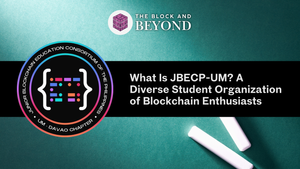While most people are still figuring out Web3, some are already preparing for what comes next.
The internet keeps evolving. From static websites to social platforms to decentralized systems, every phase introduces a new way of thinking about how we connect and interact online.
That is why Web4 is already drawing attention. Ken Berry, founder and CEO of Connect Web3, surprised many when he casually mentioned it during a recent talk at Ateneo De Davao University's SBG Week 2025.
"Guys, we're already in Web3. In fact, we're already studying Web4."
What Is Web4?
According to Onchain, Web4, also known as the “Intelligent Web” or the “Symbiotic Web,” aims to enable seamless interaction between humans and machines by combining machine learning, advanced AI, and decentralized networks to merge the physical and virtual worlds, creating smoother and more dynamic experiences than ever before.
Ken Berry’s comments suggest a future where decentralization is fully built into the foundation of the internet.
"Web4, meaning to say, there's no more decentralized internet."
Rather than being something separate, decentralization could become so embedded in how the internet works that it no longer needs to be named. Users would not have to think about wallets, keys, or blockchains. They would simply interact.
Identity and Trust
One of the clearest signs of where Web4 could be headed is in identity verification. Ken Berry pointed out how Web3 already uses advanced features to confirm identity.
"There's face recognition, iris recognition, voice recognition, fingerprint, and a lot more."
These tools go beyond convenience. They are building blocks for a future where digital trust is automatic, and where online interactions are secured by who you are, not what you remember.
In a Web4 environment, systems might rely more on biometric and behavioral data, making logins and transactions both safer and smoother.
The Role of Web3 in the Transition
Ken Berry’s focus on Web4 does not mean skipping over Web3. Instead, it means building a strong foundation now so that future technologies can scale faster. Web3 is still new for many people, but it is already reshaping how ownership, transparency, and collaboration work online.
From NFTs to blockchain-based identities, the groundwork is being laid. The Connect Web3 founder believes the lessons and tools from Web3 will naturally carry into whatever comes next.
Staying Ahead
Ken Berry’s mention of Web4 is not a prediction. It is a call to stay curious.
For students, developers, and professionals, understanding today’s technology opens the door to tomorrow’s opportunities. You do not need to be an expert yet, but you do need to pay attention.
Because as Ken Berry shows, the future of the internet will not wait. And those who start learning now will be ready for the next wave when it arrives.











